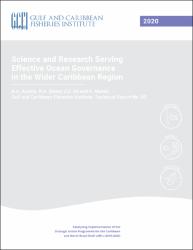Mostrar el registro sencillo del ítem
Science and research serving effective ocean governance in the wider Caribbean Region
| Licencia | Except where otherwise indicated, material from this Information Product may be copied, downloaded, reproduced and disseminated for private study, research, educational, advocacy and awareness-raising purposes, or for use in non-commercial products or services, without special permission from the copyright holder(s), provided that the appropriate acknowledgment of the source is made and that endorsement by the Author(s) and/or the GEF, UNDP and the CLME+ Project co-executing partners of the users’ views, products or services is not implied in any way. [No part of this publication may be reproduced, disseminated or used for any commercial purposes or resold without the prior written permission of the Author(s).] | es |
| Autor | Acosta, Alejandro A. | |
| Autor | Glazer, Robert A. | |
| Autor | Ali, Fadilah Z. | |
| Autor | Mahon, Robin | |
| Fecha de admisión | 2023-12-09T00:48:44Z | |
| Fecha disponible | 2023-12-09T00:48:44Z | |
| Año | 2020 | |
| Citación | Acosta, A. A., Glazer, R. A., Ali, F. Z., & Mahon, R. (2020). Science and research serving effective ocean governance in the wider Caribbean Region. Report for the UNDP/GEF CLME+ Project (2015-2020). Technical Report No. 2. Marathon, FL: Gulf and Caribbean Fisheries Institute. Recuperado de: | es |
| URI | https://bvearmb.do/handle/123456789/3731 | |
| Sinopsis | The Caribbean and North Brazil Shelf region (collectively the CLME+ region) is one of the most heavily exploited coastal zones in the world and is threatened by a diversity of stressors from local, regional, and global sources. These originate from both natural and anthropogenic sources and may include marine and land-based sources of pollution, discharges from maritime commercial activities, unsustainable fishing practices including overexploitation of fish stocks, and invasions of invasive species. All of these stressors are further influenced by a changing climate. Yet, even in the face of climate change, increasingly more coastal communities are looking at the ocean as the next frontier for economic development. This project identified priority research topics from the perspective of decision makers who are charged with implementing policies because they must have timely and relevant information to effectively create policies that contribute to the sustainability of natural resources. This report represents the results of a project conducted by the Gulf and Caribbean Fisheries Institute (GCFI) designed to identify priority research topics at the nexus of science and policy. | es |
| Idioma | English | es |
| Publicado | Marathon, FL: Gulf and Caribbean Fisheries Institute | es |
| Derechos | © Gulf and Caribbean Fisheries Institute. | es |
| URI de derechos | https://creativecommons.org/licenses/by/4.0/deed.es_ES | es |
| Materia | Investigación ambiental | es |
| Materia | Gestión ambiental - Políticas y normas | es |
| Materia | Recursos marinos | es |
| Título | Science and research serving effective ocean governance in the wider Caribbean Region | es |
| Tipo de material | Book | es |
| Tipo de contenido | Technical report | es |
| Acceso | Open | es |
| Audiencia | Technicians, professionals and scientists | es |
Ficheros en el ítem
Este ítem aparece en la(s) siguiente(s) colección(es)
-
Gestión ambiental [2929]
La consulta y descarga de este documento están sujetas a esta licencia: Except where otherwise indicated, material from this Information Product may be copied, downloaded, reproduced and disseminated for private study, research, educational, advocacy and awareness-raising purposes, or for use in non-commercial products or services, without special permission from the copyright holder(s), provided that the appropriate acknowledgment of the source is made and that endorsement by the Author(s) and/or the GEF, UNDP and the CLME+ Project co-executing partners of the users’ views, products or services is not implied in any way. [No part of this publication may be reproduced, disseminated or used for any commercial purposes or resold without the prior written permission of the Author(s).]
© Gulf and Caribbean Fisheries Institute.
© Gulf and Caribbean Fisheries Institute.


![Except where otherwise indicated, material from this Information Product may be copied, downloaded, reproduced and disseminated for private study, research, educational, advocacy and awareness-raising purposes, or for use in non-commercial products or services, without special permission from the copyright holder(s), provided that the appropriate acknowledgment of the source is made and that endorsement by the Author(s) and/or the GEF, UNDP and the CLME+ Project co-executing partners of the users’ views, products or services is not implied in any way. [No part of this publication may be reproduced, disseminated or used for any commercial purposes or resold without the prior written permission of the Author(s).]](/themes/Mirage2//images/creativecommons/cc-generic.png)